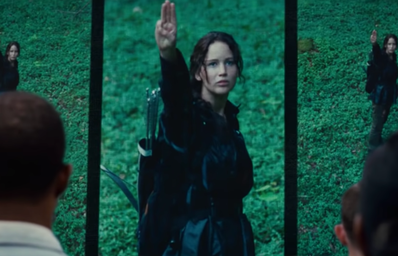In 2008, a striking reflection of society consisting of a tyrannical government, a wildly disproportionate distribution of wealth and food, and an ethical quarrel between survival and morality was released in the form of a young adult novel. Although Suzanne Collins wrote “The Hunger Games” over 15 years ago, the importance of its message is more relevant now, in 2023, than ever. When I was in middle school, I binge-read “The Hunger Games” series within a few days, acknowledging the dystopian premise but neglecting to understand the message behind it. After rereading all three books as an adult, I can finally fully appreciate the brilliance of Collins’ writing in its comprehensive context.
A central theme within these books is power derived from wealth. Wealth is not only money but also food, fashion, entertainment, and shelter, among many others. The people of the Capitol live lavishly in excess, consuming as much as they like without any repercussions. The effect of food, or lack thereof, is one of the most distinguishing factors between the people of the Capitol and the people of the districts, and Collins calls attention to this for a reason. The word ‘hunger’ is prominently displayed in the title, but what is the actual impact that hunger has on the citizens of Panem?
Why are they called the Hunger Games? The Games are a violent, sinister fight to the death, but it never exhibits hunger as an outstanding component within the arena. Originating from punishment for the districts, the Hunger Games were named fittingly to reinforce the people’s hunger as powerlessness and manipulate it into obedience. It is a cruel reminder that the districts’ hunger is the reason why the Games remain in practice. The power the Capitol holds over the availability of food is enough to get people to submit their names multiple times for the reaping in exchange for extra rations. These people are willing to risk the terror of the Hunger Games just to feed their families.
After being reaped, the tributes are treated as Capitol citizens. They are pampered then dressed in Capitol fashion, sheltered in luxurious apartments, and most pertinently, well fed. When Katniss and Peeta were initially on the train to the Capitol, Collins describes their insatiable appetites in the face of more food than they had ever seen before. They were ravenous after years of eating just enough food to survive, even needing to make sure their unaccustomed stomachs did not regurgitate it. After arriving at the Capitol, the tributes are allowed to partake in the feasts – the very picture of excess food served up on dozens of platters. In a scene from the books, it is revealed that the Capitol people have a drink specifically designed to rid the contents of their stomachs so that they can continue to gorge themselves. This visible depiction of greed only casts further criticism on the wealthy, especially after Peeta contrasts this with the food scarcity in District 12.
There is the question of why the tributes are regarded as Capitol citizens during their short stays. It may be because there is guilt surrounding the fact that most of them will die, but we see that it was not a concern in the 10th Hunger Games, as seen in “The Ballad of Songbirds and Snakes.” There may be a variety of reasons, but one is because the tributes are now claimed as the Capitol’s own. Belonging to the Capitol only means serving President Snow’s agenda and as participants of the Hunger Games, the tributes are deemed as pawns of the Capitol. For this, they must be treated accordingly, and that means being fed like one.
Although the main premise of the Games is the gruesome fight between the children of the districts, survival in nature is also a big component of being in the arena. When Katniss takes out the Careers’ food and supplies, Cato is angry enough to kill the designated guard. Being the Capitol’s favorite, Katniss receives more food from her sponsors than the others, again showing the power of the wealthy. The power of hunger becomes lethal towards the end of the games when Foxface is hungry enough to steal berries from Peeta’s collection. Unbeknownst to her, the nightlock berries were planted there by the Gamemakers to tempt tributes who were hungry enough to eat them.
When tributes become victors, they are bathed in enough riches that they will never be hungry again. This comes at a cost, however, because they still belong to the Capitol. As Cato said, there are no winners of the Hunger Games. Even after winning, the victors will have to go through their Victory Tour, serve as mentors to following tributes, and perpetuate the cycle of the Games. Although they will be well fed, they will permanently serve as Capitol citizens and as a symbol of its power.
Something Collins does really well is show that power does not just come from lack of food as seen in District 12, it also comes from the gain of food. In the Career districts, Districts 1, 2, and 4, the tributes become killing machines to serve the Capitol and achieve the glory and riches of becoming a victor. In “Mockingjay,” we see District 2 oppose the rebellion even though they did not have the same privilege of wealth as the people of the Capitol. From many victors originating from District 2, their inhabitants were also fed well from their victors’ winnings. Being allowed food, even though it was not nearly as much as in the Capitol, was still enough for them to stay loyal. Collins plays with the concept of rewards and punishments; Punishment comes in deprivation and fear, while rewards come in fulfillment and just enough hope to remain in servitude.
Greed and hunger in our current society are worryingly reflected in Collins’ writing. The corruption of wealth is seen as billionaires live in excess while impoverished communities fight to feed their families. This theme of hunger is only one of the critical themes Collins displays throughout the series, but it is an incredibly fitting representation of what constitutes power and powerlessness in our modern society. The message is finally clear to me years down the line: wealth cannot come ethically when poverty still exists.


